U of T Women in House is a program co-founded and co-managed by Tina Park and the Honourable Carolyn Bennett aimed at promoting greater female representation in government. Each year, the program takes female University of Toronto students on a subsidized two-day trip to Ottawa and provides them an opportunity to shadow female politicians on Parliament Hill, witness political procedures, and learn about gender equity.
To mark Canada’s sesquicentennial in 2017, one hundred bright female students participated in the U of T Women in House program from September 25-26, 2018. The experience included a special tour of the Supreme Court of Canada and reception with prominent cabinet ministers, parliamentarians, civil servants, and journalists. The following reflections have been written by PCJ students upon their return from Ottawa.
Muriam Fancy
Being someone who is constantly active in social justice initiatives and is hoping to go into human rights law, it was very interesting to be a part of the Women in House program that aims to challenge and question norms, laws, and conflict within society.
The program began with hearing Supreme Court Justice Andromache Karakatsanis speak being an immigrant and a woman and how those variables actually give her more knowledge and sometimes allows her to educate her colleges about those perspectives.
Later that day, we had a networking event in downtown Ottawa. Many MPs and cabinet ministers attended the event and all gave speeches about why they are participating in Women in House, but I was truly struck by MP Maryam Monsef and MP Bardish Chagger. Having the opportunity to hear them speak so passionately about increasing the diversity in gender and ethnicity within the Liberal Party was amazing. Despite there being so much racism within North America, I had the opportunity to be surrounded by individuals whom wanted those of different genders and ethnicities to participate and for those variables to not be a barrier in your success. It was a moment of happiness and inclusivity that I have not felt before. However, I do hope that in the future Indigenous peoples will also be at the forefront of those whom are representing the Canadian government.
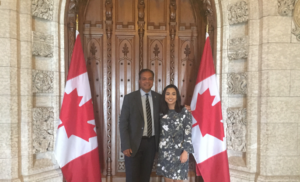 The next day, I was able to meet MP Raj Saini whom is the MP for Kitchener, Waterloo. MP Saini was a pharmacist before becoming an MP in Ottawa and this part of his career is still demonstrated to this day with his advocacy for universal pharmacare, desire to properly distribute funding to the health care sector, and his interest in global health. Saini is part of two parliamentary committees and during my time with him and his amazing team, we were able to view a meeting with the International Development Committee in which they were discussing ways in which the Canadian government can find solutions to dealing with human rights violations in Latin America, specifically, in the extractive industry.
The next day, I was able to meet MP Raj Saini whom is the MP for Kitchener, Waterloo. MP Saini was a pharmacist before becoming an MP in Ottawa and this part of his career is still demonstrated to this day with his advocacy for universal pharmacare, desire to properly distribute funding to the health care sector, and his interest in global health. Saini is part of two parliamentary committees and during my time with him and his amazing team, we were able to view a meeting with the International Development Committee in which they were discussing ways in which the Canadian government can find solutions to dealing with human rights violations in Latin America, specifically, in the extractive industry.
But by far, the highlight of my day was being able to sit down and speak with Saini’s team, Kate and Kevin. They were able to speak the ways in which they deal with inclusivity between parties, how to respond to other parties calls to the Liberal assembly, and ways in which we can participate politically in the future. This experience taught me so much about what it means to make positive differences through the government framework, either legally or politically. The process may be long and hard with barriers that one might not have anticipated, but it is truly rewarding if the end product is changing the lives for all those living in and outside of Canada for the better.
Jordan Kazan Baigrie
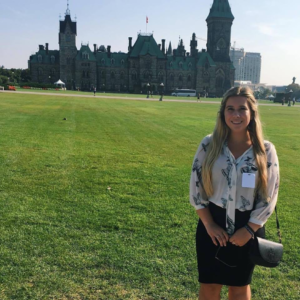 The University of Toronto Women in House Program has solidified my passion for politics and my aspirations to pursue a career in politics. Throughout my day, I truly felt as though I was treated as a valued member of a team, and that my thoughts and opinions were important to those around me, especially to Member of Parliament Rob Oliphant, who frequently asked my opinion on current international issues.
The University of Toronto Women in House Program has solidified my passion for politics and my aspirations to pursue a career in politics. Throughout my day, I truly felt as though I was treated as a valued member of a team, and that my thoughts and opinions were important to those around me, especially to Member of Parliament Rob Oliphant, who frequently asked my opinion on current international issues.
My day began early with an in-camera committee meeting on citizenship and immigration, which were allowed to attend as we were unanimously voted into the meeting. The meeting involved discussing the illegal crossings of refugees into Canada, and was absolutely fascinating, especially watching the opposition and government work together on a pressing issue. Rob Oliphant discussed with us the importance of finding something in common with others, especially constituents, regardless of whether or not you are in the same line of work.
Every time that I walked back through the arch of Centre Bloc at Parliament, I felt a rush go through my body, my steps hastening with excitement. We attended an informal committee meeting at the Parliamentary Restaurant which dealt with LGBTQ+ issues and throughout, we were involved in the discussion with the members of parliament and frequently asked for our opinions on issues being brought up. I was able to debate and discuss political beliefs and issues within a welcoming environment at Parliament and to be treated as a valued member of the discussion, specifically in one with multiple members of parliament, was amazing.
Overall, my experience as part of the 2017 cohort of the University of Toronto Women in House Program went above and beyond my expectations and left me more eager than ever to make my way on to the Hill one day in the future. I began searching online for ways to be involved with the Liberal Party on the bus home, more driven than I have ever been before in my studies. A major reason why the trip, and my participation, was such a success was MP Rob Oliphant, who made every effort to include us in his day and allow for us to be involved in as much as possible. My favourite part of the experience was definitely the LGBTQ+ committee meeting and having my voice and opinions matter, which is often times hard for the younger generation within politics.
In summary, the Women in House Program has only increased my drive to be involved in politics, having given me a taste of my dream. The Women in House Program was excellent encouragement for my continued studies in Peace, Conflict and Justice Studies and allowed me to draw from my existing pool of knowledge about conflict and justice while in Parliament as a result. My studies in PCJ prepared me for my trip to Parliament, and hopefully will support a potential career in politics.
Katrina Van Genderen
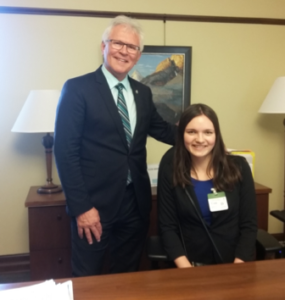 I had the pleasure of shadowing Wayne Stetski, the MP for the Kooteney—Columbia riding and National Parks critic for the NDP. I thought I would feel very intimidated but he was very humble and down-to earth and him and his staff prioritized my education and experience above all else.
I had the pleasure of shadowing Wayne Stetski, the MP for the Kooteney—Columbia riding and National Parks critic for the NDP. I thought I would feel very intimidated but he was very humble and down-to earth and him and his staff prioritized my education and experience above all else.
He had a fairly busy schedule and I had the amazing opportunity of being able to sit in on two committee meetings he was a part of. For both of which, there were five Liberal MPs, three Conservatives, and only him representing the NDP. I had not realized how challenging it was to be a part of a party with a small number of seats. All other parties had supporters on their side and sat in a unified group while he sat alone, surrounded by empty chairs, arguing different ideas. While the other parties took turns asking questions, he was always the only one to talk on behalf of the NDP. He explained to me that it was always like this and that entering partisan politics was one of his greatest challenges of being an MP (as opposed to his previous experience as a mayor). I now have great respect for all smaller parties as expressing contrasting views without support is a very challenging thing to do but incredibly important for a successful democracy.
After the committee meetings, I observed the question period. The first thing I noticed, now that all of the MPs were in one place, was the shockingly small number of females in politics. I knew the numbers beforehand, but seeing it in person was staggering and made me see the necessity of this program. The question period was definitely the most entertaining part of the trip as everyone, especially the opposition, was much louder and expressive with their criticism and partisan support.
I left this trip feeling empowered by the women who had overcome so much adversity to be in their current position as well as feeling less intimidated by the political process. These MPs are just normal people who worked very hard and accumulated experience to get where they are. Being successful in politics no longer seems like an insurmountable goal.
Julia Mogus
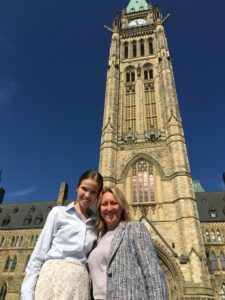 As I sat in the very room where the supreme law of the land is practiced, debated and instituted I couldn’t help but feel a surge of joy and happiness overcome me. Perhaps what I was most amazed by on this trip was the fact that we were given not only the opportunity to visit the Supreme Court of Canada, but also the opportunity to engage in a question and answer session with Justice Andromache Karakatsanis. She talked about the importance of gender equality and the ways in which the Supreme Court can continue to recognize diversity and adapt to the ever-changing Canadian landscape. She mentioned that one of the ways in which the legal system can aim to be more inclusive is to provide a greater platform for minority groups to voice their interests. However, it was her profound explanation to a question asked about what justice means to her that I could take a moment a reflect how this relates to my understanding of justice.
As I sat in the very room where the supreme law of the land is practiced, debated and instituted I couldn’t help but feel a surge of joy and happiness overcome me. Perhaps what I was most amazed by on this trip was the fact that we were given not only the opportunity to visit the Supreme Court of Canada, but also the opportunity to engage in a question and answer session with Justice Andromache Karakatsanis. She talked about the importance of gender equality and the ways in which the Supreme Court can continue to recognize diversity and adapt to the ever-changing Canadian landscape. She mentioned that one of the ways in which the legal system can aim to be more inclusive is to provide a greater platform for minority groups to voice their interests. However, it was her profound explanation to a question asked about what justice means to her that I could take a moment a reflect how this relates to my understanding of justice.
She argued that justice is versatile in that justice is reflected differently in every case, but at its core, justice reflects the rule of law. As a student of PCJ and Criminology this deeply resonated with me because throughout my courses I am encouraged to look both at the macro and micro perspectives of various conflicts. Moreover, in my question to her I asked if she could talk about the challenges she had to overcome (and any she continues to face) and how she was able to overcome them. In her part of her response she jokingly said that being a Justice is like living with eight spouses, but through team work and putting aside any personal judgment she and her team are able to work together to help uphold the law and bring justice to where it is most needed.
My experiences in Ottawa would not have been possible without the amazing hard work of the U of T Women in House program, the founder Tina Park, and my wonderful MP Mona Fortier who had so graciously opened her doors. We were given the opportunity to listen in on a meeting with members of anti-landmine organizations from around the world to discuss how Canada can support the twentieth anniversary of the Ottawa Treaty. After being treated to a wonderful lunch at the Parliamentary Restaurant, we were brought to view Question Period, where we witnessed Parliament engage in critical debate about important issues like Indigenous rights and the Status of Women. Finally, as we were leaving, Mona told me that if there was one piece of advice she could give us as we embark on our own journey was to work hard and never give up your dreams.
Maria-Alba Benoit Mariaca
The energy and excitement in the air seemed tangible as I, along with 99 other young women from the U of T Women in House program, arrived in Ottawa for an eventful two days.
The Supreme Court of Canada was filled with 100 young women from the University of Toronto eager to listen to see, understand, and learn what it is like to be a woman in politics. Justice Andromache Karakatsanis granted us the honour of answering our questions in a private session for an hour. She made the experience deeply personal as well as professional, showing us it is possible to introduce this careful balance as a Justice.
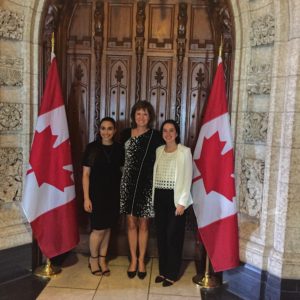 U of T Women in House brings together women who share similar passions, and allows for a space in which we can grow and learn from one another. The reception later that day epitomized this coming together to empower women and the voices of the underrepresented. Hearing the speeches of The Honourable Carolyn Bennett, The Honourable Karina Gould, The Honourable Bardish Chagger, The Honourable Maryam Monsef, MP Elizabeth May, MP Celina Caesar-Chavannes, amongst many others, was an incredible source of inspiration since I could see myself represented by the women present. Women of all walks of life, who are dedicated to Canadians, were encouraging me, affirming that I am powerful and strong.
U of T Women in House brings together women who share similar passions, and allows for a space in which we can grow and learn from one another. The reception later that day epitomized this coming together to empower women and the voices of the underrepresented. Hearing the speeches of The Honourable Carolyn Bennett, The Honourable Karina Gould, The Honourable Bardish Chagger, The Honourable Maryam Monsef, MP Elizabeth May, MP Celina Caesar-Chavannes, amongst many others, was an incredible source of inspiration since I could see myself represented by the women present. Women of all walks of life, who are dedicated to Canadians, were encouraging me, affirming that I am powerful and strong.
After shadowing MP Pam Damoff for a day, she has become a woman and politician I look up to. It is her strength, especially when standing up for what is right, that makes MP Damoff stand out. I am grateful to have been able to talk to her freely, ask personal questions and receive honest answers. I was able to witness the progression of two committees, and I learnt the importance of an MPs role as the representative of the people in their riding as well as Canadians as a whole, when their interests and voices are at stake. I feel very honoured and privileged to have reaffirmed that I, as a woman, have the ability to stand up for what I believe in and make the community I live in a better place.
Women have been crucial in the development of our democracy and in shaping the Canada we call home. To be able to celebrate Canada’s 150th through this program is a way for us to recognize and pay homage to the women that have come before us, and paved the path we currently stand on to uphold our rights. The women leaders in this program are a testament to how far we have come, and how much further we can go.